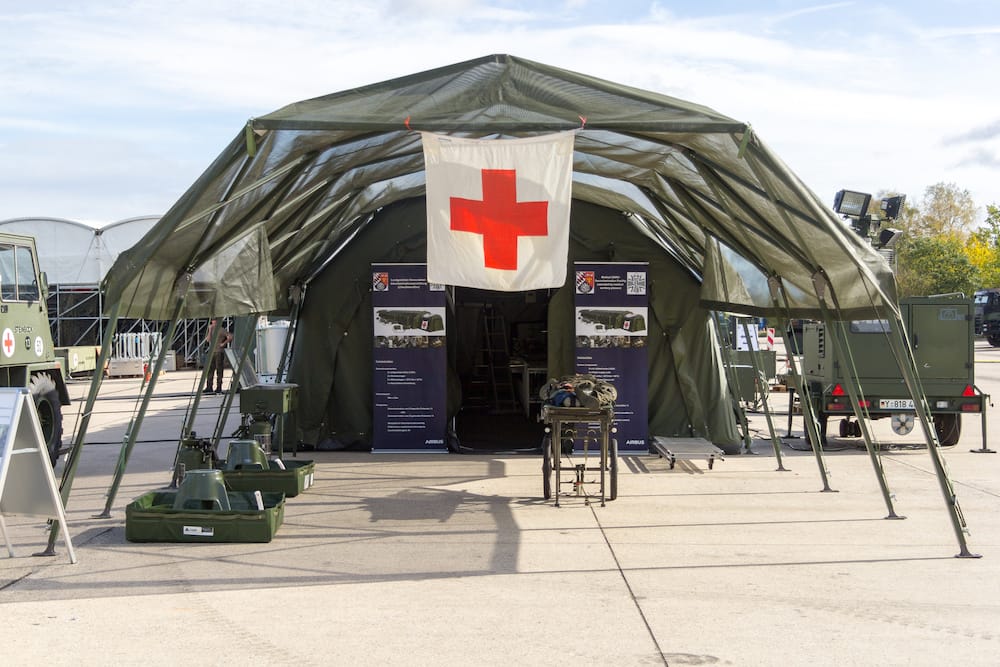Living close to a hospital can be a factor in why homebuyers choose to settle in a nearby residential area. They can quickly rush to the closest medical facility for any health-related emergency. The COVID-19 pandemic’s beginning impacted the medical world. It led to the deployment of field hospitals to accommodate incoming patients with COVID symptoms.
Medical institutions can set up these temporary field hospitals anywhere as needed. This article explains the benefits of field hospitals and why we’ll see more of them than usual.
- Proper Patient Isolation
Field hospitals are tent-like structures that are easy to set up. These spacious tents have divisions where health professionals can set up different units according to established health systems.
These rooms separate patients to contain the spread of diseases. Front-line medical personnel attending other tasks will be safer, as the tent walls protect the healthy staff.
Portable field hospitals are also easier to erect, which saves time, especially in critical or high-risk areas. They can easily accommodate the influx of patients who immediately need medical assistance. Field hospitals can include the following:
- Triage room for admission
- Prep rooms
- Emergency room
- Operating room
- Staffroom
- CT scan unit
- Patient Ward
- Laboratory/Pharmacy
- Portable showers and toilets
- Generators/water pumps
The goal is the fast deployment of facilities to provide primary healthcare in emergencies. These temporary hospitals are beneficial in emergency centers, combat and disaster zones, and intensive care.

- Scalable And Self-Sufficient
The first applications for portable hospitals were to assist soldiers and other personnel stationed at bases and disaster areas. These hospitals don’t need heavy machinery to build. There’s also no need for individuals to have construction expertise.
Field hospitals can run on solar panels, generators, and batteries to operate hospital equipment for diagnosis, monitoring, and treatment. Healthcare professionals can set up these hospitals to be sterilized units for treating the sick and the wounded across the globe.
The versatility of field hospitals also includes units that personnel can use as positive or negative pressure rooms for keeping contaminants at bay. The rooms can also house pre-operative, post-operative, and beds for intensive care unit patients for different care levels.
These portable hospitals are also built from pre-fabricated panels to make them scalable, serving as a small response unit as a starter unit with a few beds. They’re also expandable into multiple operating rooms. The other units can also house many patients simultaneously.
- Broadens Staff Knowledge In Disaster Management
Deployable field hospitals benefit patients and healthcare workers. The nature of their work allows them to learn more in a different setting. Professionals get to see and experience various medical challenges that give them opportunities to improve their competencies in disaster preparedness.
These disasters include natural disasters, terrorist attacks, or medical outbreaks that won’t be apparent to them if they worked in a conventional hospital or facility. Field hospitals provide medical personnel with the equipment and training to think on their feet in emergencies.
They are away from the traditional setting, which will benefit them to gain different experiences and become better healthcare providers. Being in a field hospital allows them to gain problem-solving expertise in different situations and widen their scope of knowledge regarding conditions, accidents, diseases, and more. It will help them understand and treat their patients better.
- Climate Control Features
Field hospitals also come with customized cooling, heating, and drying solutions. These facilities have been housing military and humanitarian operations for years, bringing dependable climate control for various purposes.
These mobile solutions are on par with the North Atlantic Treaty Organization (NATO) standards and were developed with tent and container suppliers. They were also designed to meet the Allied Quality Assurance Publications (AQAP) requirements and ISO 9001/14001 quality standards. Various manufacturers have a range of tents to serve as field hospitals with climate control features.
Field hospitals can also hold freezers that contain vaccines and other sterilized equipment. They could also provide heating for occupants in frigid conditions. The heating system can deliver clean, warm air through a heat exchanger safely inside the field hospitals. Components that create the combustion are connected to vents that allow fumes to escape through external chimneys. Through this solution, patients continue to recover with proper ventilation and steady temperatures.
Field hospitals provide temporary shelter but are also enough to become field hospitals to treat and care for patients. They’re also durable that can withstand various weather patterns and climates.
In Conclusion
Portable field hospitals are essential in healthcare because of their benefits to patients and professionals. They feature partitions perfect for isolating patients and serving as separate units. These temporary facilities are also self-sufficient, providing power to various hospital equipment.
They also have climate control systems to keep vaccines and medicines cool and provide heating for patients. Field hospitals also help broaden the experience and knowledge of health workers. They are valuable during uncertain times as they supplement hospitals and clinics amid the surge of patients.
Throughout the year, our writers feature fresh, in-depth, and relevant information for our audience of 40,000+ healthcare leaders and professionals. As a healthcare business publication, we cover and cherish our relationship with the entire health care industry including administrators, nurses, physicians, physical therapists, pharmacists, and more. We cover a broad spectrum from hospitals to medical offices to outpatient services to eye surgery centers to university settings. We focus on rehabilitation, nursing homes, home care, hospice as well as men’s health, women’s heath, and pediatrics.








